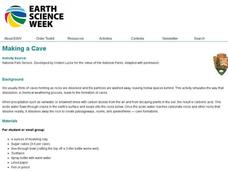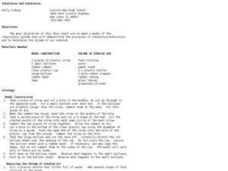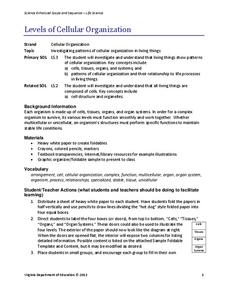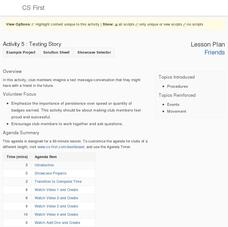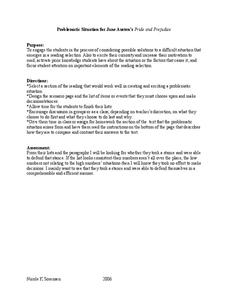Curated OER
Making a Cave
Students discuss caves. In this science instructional activity, students experiment with how dissolution, a chemical weathering process, leads to the formation of caves. Once the cave is finsihed students draw a picture or describe in...
Curated OER
Buried Treasure
Students examine the role of micro and macro organisms in the decomposition process. They record their observations and discuss. They also read a book about decomposition.
Curated OER
Study Buddies: Working With Fractions
For this math worksheet, students will work with a coach to solve a fractions story problem. Students will follow a step-by-step process and notes are provided for the coach.
Curated OER
Hatching chickens
Learners recognize the need for gentle care of eggs. In this chicken hatching instructional activity, students observe the process of incubating eggs for hatching. Learners find the materials needed to properly care for the chicks....
Curated OER
Inhalation and Exhalation
Students investigate inhalation and exhalation of the respiratory system. They construct a model of the respiratory system using balloons, straws, cups, and rubber bands. Then, they observe inhalation and exhalation and measure the...
Curated OER
Case of the Missing Pumpkin
Students explore the process of decomposition. In this science instructional activity, students carve a pumpkin and observe as it decomposes. Students compare the changes to an uncarved pumpkin. Students write about the disappearing...
Curated OER
Candlemaking
There might not be a butcher or baker, but you'll have a class full of candlestick makers after a hands-on lesson about candles make from beeswax. After a brief history of where beeswax comes from, young artisans craft their own...
Virginia Department of Education
Levels of Cellular Organization
What an eccentric way to learn about each level of cellular organization! Allow emerging biologists to utilize white paper and create their own foldable charts to describe each level of organization in the body. You may also adapt the...
Moorea Coral Reef Long-Term Ecological Research Program
Paper Plate Fishes
Tropical fish make great art projects! Use paper plates to design, color, and assemble round and oval-shaped fish based on photographs of actual fish found along the Moorea Coral Reef. Kids learn about different fins- including the...
Olomana School
Mixtures and Solutions: Paper Chromatography Experiment
Why does some ink bleed through paper, and other ink doesn't? Practice some paper chromatography to separate the colors from a pen with an interactive experiment for middle and high schoolers. Learners use a variety of solutions to track...
US Environmental Protection Agency
Role of Plants in Water Filtration
Investigate the amazing ability of plants to filter contaminants from water with this series of in-class demonstrations. After placing six small, potted plants in plastic cups, different solutions and mixtures are poured into them that...
Mathematics Vision Project
Geometric Figures
Logical thinking is at the forefront of this jam-packed lesson, with young mathematicians not only investigating geometric concepts but also how they "know what they know". Through each activity and worksheet, learners wrestle with...
Messenger Education
Look But Don’t Touch—Exploration with Remote Sensing
Mars is home to the tallest mountain in our solar system, Olympus Mons. In this set of two activities, learners review geologic land formations through the analysis of aerial maps. They then apply this knowledge to aerial maps of objects...
Polar Trec
Why Can’t I Eat This Fish?
Can turning on the television lead to toxins in the food supply? The lesson offers an opportunity for young scientists to complete guided research. A worksheet lists each question as well as the web page necessary to answer the question....
Google
Friends: Texting Story
Sometimes it's okay to text in school. Young computer scientists work in the Scratch program to write a text message conversation among friends. They use different sprites within the program to represent each side of the conversation to...
Re Energy
Build Your Own Biogas Generator
What is biogas and how is it made? After examining background information about the sources of biogas and biogas generators, class members follow the provided information and build a biogas generator that can be used in the classroom.
Santiago Canyon College
Taking Notes for Science Class
Provide young scholars with the tools they need to succeed with this reference on the Cornell note-taking strategy. By breaking the content of lessons into main ideas, supporting details, and overall summaries, students are able to...
Curated OER
Pride and Prejudice: Problematic Situation
What would you do if your sister ran off with a man whom you didn't trust? Explore a scenario based on Jane Austen's Pride and Prejudice. Once kids work though the problem, they read the appropriate chapters from the book and write a...
NOAA
Deep-Sea Ecosystems – Entering the Twilight Zone
Imagine an ecosystem without any light or oxygen, where living things convert carbon dioxide into food. This ecosystem is thriving and might just be the largest ecosystem on our planet, yet we know very little about it. The instructional...
Curated OER
How Does a Green Plant Grow?
Students of all ages can explore the question "how do seeds grow?", design an experiment to answer the question, predict the outcome of the experiment then conduct the experiment.
Curated OER
Chromatography
Students investigate the separation of mixtures using plant pigments. Using everyday items, they demonstrate the separation of pigments in plants through the process of chromatography.
Curated OER
Leaf Straw
Learners investigate plant structure and the process of photosynthesis. Using everyday items, they demonstrate that the leaves and stems of plants can act like a straw. In addition, they identify plant structure.
Curated OER
Erosion and Deposition
Fifth graders study the processes of erosion, transportation, and deposition in soil. They walk outside the school to see examples and then accurately create a physical model which shows each type of soil movement and allows them to...
Curated OER
Make Your Own Thermometer
Students recognize the concept of temperature, including degrees, and the melting and freezing process. In this 1st - 2nd grade lesson plan, students identify the temperature of various objects, as well as create their own paper...


